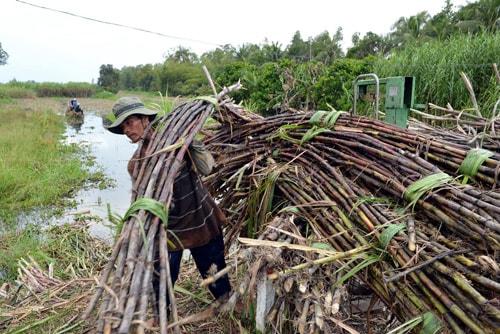Farmers in the integration trend
International economic integration creates opportunities for farmers to have more jobs, increase income, contribute to poverty reduction and even get rich. However, integration also puts farmers in the vortex of competitive pressure and is regulated by the fierce "supply-demand" law of the market.
The playing field will be more fierce
Vietnam’s agricultural sector is integrating more and more deeply and widely with the world. Along with policies to encourage production and trade, our country’s agriculture is gradually adapting to the globalization trend in production and business.
Cannot protect forever
Recently, there have been mixed opinions about Hoang Anh Gia Lai Group's request to import 30,000 tons of raw materials to process sugar for export. Meanwhile, the Vietnam Sugarcane and Sugar Association (VSSA) has submitted a request not to allow the import. According to agricultural experts, the import of raw materials may affect thousands of sugarcane producing households and dozens of sugar factories, but when we have joined the world's common playground, we must be subject to the law of elimination.
 |
| Sugarcane harvest in Hung Dien commune, Phung Hiep district, Hau Giang province. |
In fact, protectionist policies for many years have made domestic sugar prices much higher than world sugar prices. For example, the cost of raw sugarcane in Laos and ASEAN countries is only about 300 VND/kg, while in the Mekong Delta it is nearly 800 VND/kg. Not only sugar prices, milk prices in Vietnam are also very high. According to agricultural experts, in the integration process, these phenomena will no longer exist.
After nearly 7 years of joining the WTO, agriculture is still a solid social support. In fact, although the agricultural sector has not received much investment in science, technology and infrastructure, it has dominated many markets in the world. In 2012, the export turnover of agricultural products reached a record 27 billion USD.
Mr. Dang Kim Son, Director of the Institute of Agricultural Policy and Strategy (ISPARD), said that in order to move towards a modern agriculture and participate deeply in the world's commodity value chain, Vietnam cannot rely on an agricultural growth thanks to attracting more resources, taking more land, taking more labor and pouring more materials into production. In the future, we will no longer have those factors, while the requirements for food safety and hygiene are increasing.
According to expert Nguyen Lan Huong, Food and Agriculture Organization of the United Nations (FAO), Vietnam's agricultural sector relies mainly on smallholder farmers because this group accounts for 99% of the 10 million households directly involved in agricultural production. Currently, there are about 20 million workers directly involved in agricultural production and each year, 600,000 more people join this sector.
The results of a recent study by the Ministry of Agriculture and Rural Development (MARD) on “Assessing the impact of implementing WTO and regional commitments on agriculture and rural development” show that agriculture and rural areas, which account for more than 70% of the population and about 21% of the country's GDP, are the most vulnerable and disadvantaged group in the process of international economic integration.
Farmers and integration
Integration is simply understood as the gradual removal of protectionist barriers and tariff barriers. Production households, businesses, and enterprises, regardless of whether they are domestic or foreign, are equal on the same playing field. The agricultural sector is no exception to this rule. Many sectors will develop, but many sectors without advantages will be forced to "sacrifice". The problem of which sectors to "sacrifice" has not yet been clearly defined, while the "air" of integration is "breathing" into the necks of some sectors.
Expert Nguyen Lan Huong (FAO) said that for Vietnamese farmers, the expansion of international trade creates new opportunities, more jobs, increased income and contributes positively to poverty reduction. However, people must gradually get used to the competitive market and be regulated by the fierce "supply - demand" law of the market.
In this fierce integration process, Mr. Dang Kim Son, Director of ISPARD Institute, said that the subjects that need the most attention are farmers, the poor, and small businesses. According to the rules, those who cannot survive in the game will be eliminated, but for now, they cannot immediately change their industry or profession, so they need support from the State.
Some agricultural experts believe that we must have a plan to build irrigation and new farming systems from seed to post-harvest so that people can switch to other more effective crops and livestock. We cannot wait until the low tax rate is applied, or it will be too late.
In addition, localities must review, based on soil conditions, climate, and production scale, and places that do not have advantages over competitors should switch to other fields.
Minister of Agriculture and Rural Development Cao Duc Phat said that in the current context, the agricultural sector is focusing on implementing extensive restructuring towards increasing added value and sustainable development. This will be the most important and fundamental solution to promote the integration of Vietnamese agriculture.
Theo News






